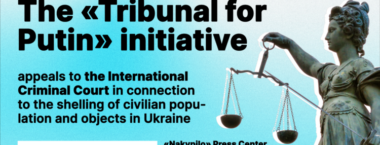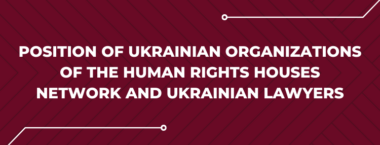Ukrainian Helsinki Human Rights Union welcomes the initiative of the President of Ukraine Petro Poroshenko to withdraw the draft law No. 8297 “On amendments to the Law of Ukraine “On the citizenship of Ukraine” regarding improvement of certain provisions”.
This draft law, which (allegedly) provided for deprivation of Crimean residents of the Ukrainian citizenship in case of exercising electoral or other rights and obligations granted/envisaged by the foreign citizenship of the occupying power, became highly disputable in the Ukrainian society. According to the human rights defenders, although said draft legislation laid no ground for citizenship deprivation, it still contained a number of shortcomings that could lead to violation of human rights of Crimeans (the detailed analysis of UHHRU is given here, in Ukrainian).
The President notes that the draft law on citizenship will be elaborated, specifically by including in it a “provision on collaborators”, and a separate draft law will be developed to address this issue.
UHHRU expresses its readiness to contribute to the open and inclusive process of drafting of legislation related to the armed conflict and occupation.
We stress the importance of implementing a clear and transparent Ukrainian state policy toward the occupied territories and their residents, as well as of establishing a dialogue between the government and citizens of Ukraine in the occupied territories. Under conditions of the armed conflict, state authorities should pay close attention to political messages and assess potential negative consequences of any actions aimed at ending the conflict and overcoming its effects. When registering bills concerning the rights of people from the occupied territories, the government should publicly state the purpose of such initiatives and their contents, involve civil society experts in the discussion/development process, and make such initiatives as clear to the public as possible, while making sure that these initiatives adhere to the principles of human rights protection, legal certainty and international humanitarian law.
Moreover, UHHRU’s deep belief is that Ukraine’s transition from the conflict to post-conflict resolution and peacebuilding requires creation of a tailored transitional justice model[1], which shifts the emphasis from retributive (punitive) justice dimension, which is focused on bringing the perpetrators to justice, to the recovery dimension focused on rehabilitation and restoration of human dignity.
Thus, in our opinion, the legislation on wartime collaboration, collaborators and amnesty should clearly define what collaboration is as well as determine grounds for release from liability and categories of persons subject to an amnesty, thus establishing fair individual responsibility for committed war crimes, crimes against humanity and gross human rights violations as well as other criminal offences occurred in the course of an armed conflict and occupation.
In particular, UHHRU jointly with other non-state and state actors under the Ombudsperson’s umbrella has already co-designed the draft law “Public Policy Fundamentals regarding Human Rights Protection in the Context of addressing Armed Conflict Effects” underlining that:
”Among the tasks of public policy is to establish fundamentals of political, criminal and other liability for persons that committed war crimes or crimes against humanity, facilitated occupation, took part in seizure of state power at the national level and level of the local self-government authorities, as well as persons engaged in the activities of authorities of the occupying power; and to determine grounds for granting a discharge, determining categories of persons which may be amnestied”.
Full text of the draft law is available here.
It is important that adoption of this draft law, which is an integral element of tailored national transitional justice model, will officially launch transitional justice mechanisms at the state level in order to put an end to impunity; ensure justice for war victims and conflict affected population; ensure accountability for perpetrators; ensure the right to the truth concerning gross human rights violations and Russia-led aggression, as well as guarantees for non-recurrence in the wider perspective of peace-building.
Ukrainian Helsinki Human Rights Union
[1] Transitional justice is a set of judicial and non-judicial measures implemented by societies to redress legacies of massive human rights abuse so numerous and so serious that the normal justice system will not be able to provide an adequate response. It includes ensuring justice for victims, establishing facts and truth-telling, reparation programs, and guarantees of non-recurrence/institutional reforms



